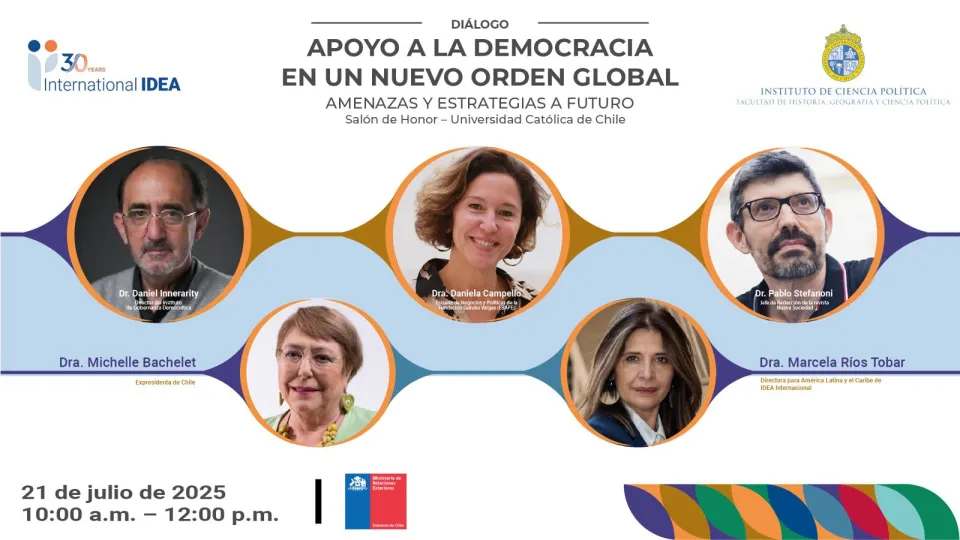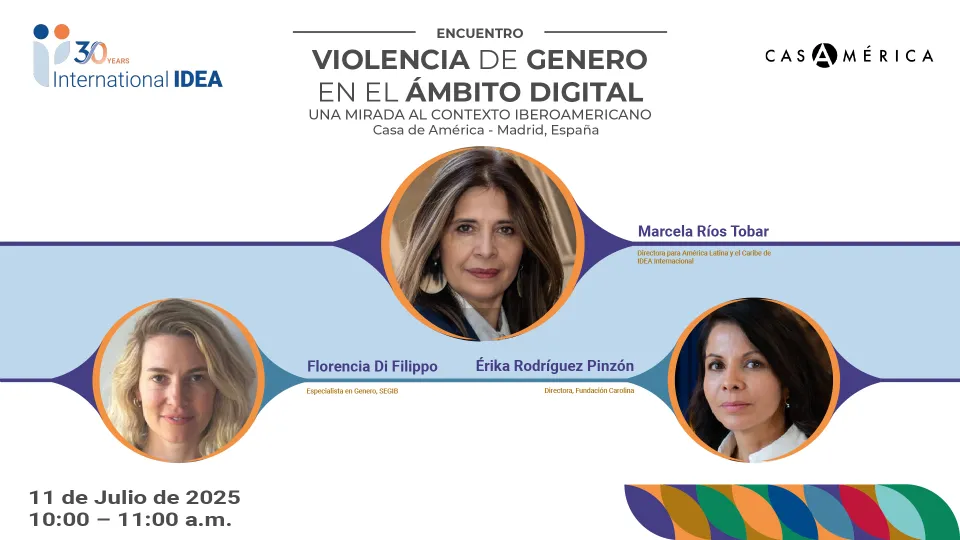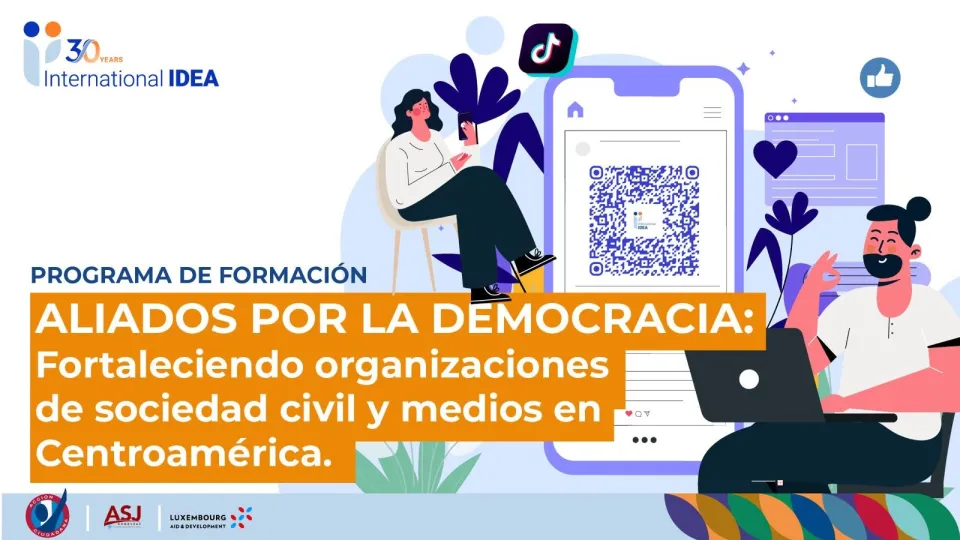Money is an essential resource for politics and voter outreach. However, if not effectively regulated, it can compromise the integrity of political processes and democracies. Effective state regulation of funding of political parties and election campaigns (commonly known as political finance) and their implementation are vital for promoting the integrity, transparency, and accountability of democratic systems of government.
Búsqueda
Region
Country
Type
The International Institute for Democracy and Electoral Assistance (International IDEA) and the Rule of Law Centre of Finland (RoL Centre), in partnership with the Central Election Commission of Bosnia and Herzegovina, will host the regional conference “Which Role for Artificial Intelligence in Electoral Processes?”, taking place in Sarajevo, Bosnia and Herzegovina on 16 April 2024.
On the 22nd and 23rd of November 2023, the International Institute for Democracy and Electoral Assistance (International IDEA) in partnership with members of the Network for the Promotion of Constitutionalism in Eastern Europe is organizing a roundtable discussion 'Democratic Resilience: Does Institutional Design Matter?' in Yerevan, Armenia.
Mr. Oleh Didenko, Chairperson of the Central Election Commission of Ukraine and Mr. Ilirjan Celibashi, the State Election Commissioner of Albania, signing the Memorandum of Understanding between the Central Election Commission of Albania and Ukraine in Tirana, Europe day, May 9, 2025.
This case study examines the impact of extensive flooding and landslides on the conduct of local elections in Bosnia and Herzegovina in 2024. It evaluates the response of EMBs in the complex administrative environment of the country, including their preparedness and capacity to manage a potential crisis just two days before polling.
On 4 April 2025, International IDEA facilitated a high-level working meeting in Chișinău between the Central Election Commission (CEC) of Ukraine and the Central Election Commission of the Republic of Moldova. The exchange was part of International IDEA’s continued support to electoral institutions in Eastern Europe, fostering dialogue, peer learning, and democratic resilience in times of significant regional challenges.
Chișinău, 2–3 April 2025 – As Ukraine looks ahead to organizing post-war elections, ensuring institutional resilience is more important than ever. In response to the Central Election Commission’s (CEC) strategic priority to institutionalize electoral risk and crisis management, International IDEA facilitated a two-day high-level workshop in Chișinău, Moldova.
There is no single model of parliamentary outreach to citizens, but there are common challenges. Sharing these experiences can generate learning, adopting innovative practices or adapting existing practices to ensure they are effective.
Following the recommendations from the Parliamentary Electoral Dialogue convened in Brussels in May 2023 by International IDEA and the European Parliament, Ukrainian authorities are diligently examining the conditions in host countries for organizing
On 12-14 November 2024, the Secretary-General of International IDEA, Dr Kevin Casas-Zamora, alongside Sam van der Staak, Director for Europe; Jonathan Murphy, Head of the INTER PARES Programme; Yuliya Shypilova, Programme Manager for Elections and Parliamentary Strengthening; and Iryna Pushchyk, Programme Assistant; undertook a landmark mission to Ukraine.
On December 6, 2024, the European Social and Economic Committee (EESC) hosted a Policy discussion titled “Forging the European Democracy Shield: Expanding Scope, Deepening Impact, and Maximising Political Leverage” in collaboration with International IDEA, the European Partnership for Democracy and the Kofi Annan Foundation. Nearly 100 participants attended the event, including civil society, member states, EU institutions, academia, and media.
On November 5, 2024, International IDEA successfully hosted a one-day workshop in Brussels titled Designing a Global Methodology for Analyzing Electoral Foreign Information Manipulation and Interference (FIMI).
El 19 de septiembre de 2024, más de veinte expertos y participantes debatieron los resultados y recomendaciones de la “Evaluación de las necesidades de la Verkhovna Rada de Ucrania para introducir un currículo de educación parlamentaria sobre el Parlamento Europeo y los aspectos relevantes de la integración en la UE”, que fue desarrollado por IDEA Internacional. El evento titulado “Cómo educar sobre el Parlamento Europeo y la integración en la UE: presentación de la nueva propuesta de marco curricular” fue organizado en el marco del Programa “RADA: Next Generation” (RANG) de USAID.
On 19 September 2024, over twenty experts and participants discussed the results and recommendations outlined in the 'Assessment of the Verkhovna Rada of Ukraine’s Needs for Introducing a Parliamentary Education Curriculum on the European Parliament and Relevant Aspects of the EU Integrations', which was developed by International IDEA. The event titled "How to educate on the European Parliament and EU Integration: presentation of new curriculum framework proposal" was organized within the USAID "RADA: Next Generation" Program (RANG).
Von der Leyen tiene una oportunidad única de presentar su Escudo Europeo de la Democracia como la piedra angular de su agenda de seguridad. Debería hacerlo tanto en casa como en el escenario global. Su Libro Blanco anunciado sobre el Futuro de la Defensa Europea es el lugar para hacerlo.
This article was first published as a guest contribution in Friends of Europe's 'Critical Thinking' Online Policy Magazine
By Sam van der Staak, Director for Europe at the International Institute for Democracy and Electoral Assistance (IDEA)
Following the recommendations from the Parliamentary Electoral Dialogue convened in Brussels in May 2023 by International IDEA and the European Parliament, Ukrainian authorities are diligently examining the conditions in hos
Siguiendo las recomendaciones del Diálogo Electoral Parlamentario convocado en Bruselas en mayo de 2023 por IDEA Internacional y el Parlamento Europeo, las autoridades ucranianas están examinando diligentemente las condiciones en los países anfitriones para organizar la votación en el extranjero (OCV) para las futuras elecciones de posguerra en Ucrania.
On July 2-3, 2024, the Republic of Moldova hosted the Regional Conference on Money in Politics 2024, themed "Money in Politics in the Era of Globalization and Digitalization." This significant event brought together over 150 participants from nine countries, including political finance oversig


